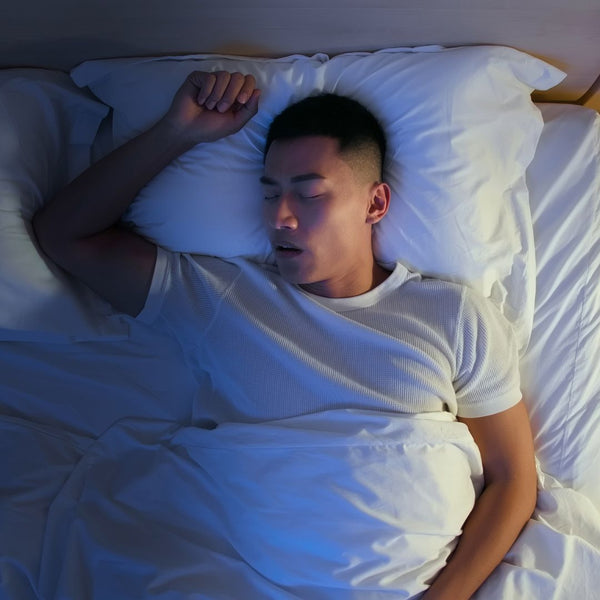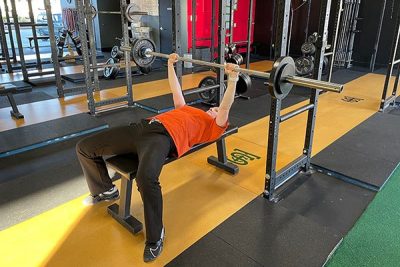
If you’re looking to maximize your gains in the gym, you need to look at a place about as far from it as possible: the bedroom. No, this isn’t that type of article. We’re talking about sleep habits and hygiene. Sleep is perhaps the most overlooked aspect when it comes to muscle building and athletic performance. Optimizing your sleep routine can significantly help enhance recovery and increase your overall fitness results.
Many people struggle with sleep, and while we’re not doctors, we have some recommendations on how to increase the quality of your sleep so you can perform to your full potential during your workouts.
Sleep Effects On Recovery & Exercise Performance
Alright, so besides needing sleep so you’re not in a brain fog all day, what exactly does sleep have to do with physical changes? Sleep is essential for muscle repair, hormone regulation, and overall physical recovery.
During various stages of sleep, your body starts releasing growth hormone, which, as we all know, will help your muscles recover and grow. There are conflicting studies on when the growth hormone is released, with some saying that it only happens in deep and REM sleep. While others haven’t been able to reproduce those results and instead found growth hormone release throughout a night’s sleep, regardless of which stage of sleep they were in.
Ok, so now we know it’s good to sleep because that’s when our body becomes its own little growth hormone factory. But besides not getting a little hormone boost, what else happens when you forgo some zzz’s?
Research has shown that inadequate sleep can increase fatigue, impair cognitive function, slow reaction times, and increase risk of injury.¹
A study published in the Journal of Science and Medicine in Sports found that sleep deprivation negatively impacts muscle strength and endurance.² Another study highlighted the importance of sleep in regulating cortisol and testosterone levels, which found a correlation between poor sleep and lower testosterone and higher cortisol levels.³ As we all know, testosterone is vital for muscle recovery and performance.
Related: Importance Of Sleep & Sports Performance
4 Tips For Better Sleep
Ok, no sleep bad. Now what? Before you came to this article, I’m assuming you knew a lack of sleep isn’t a good thing and are looking for ways to help knock out at night. We have some tips that might just help:
1. Dark, Cool Room
Ensure your sleeping environment is dark and cool. Consider using blackout curtains and keeping the room temperature between 60-67°F (15-19°C). Blackout curtains can be a game-changer if you live in an urban environment or if you work the second shift and need to sleep past sunrise.
2. Comfortable Bedding
You spend about ? of your life in bed, get a good mattress. With the popularity of online mattress delivery services, prices for a decent bed have gone way down. Of course, you can spend several thousand dollars on a mattress, which, if you have the money, go for it. For those of us that aren’t rolling in the dough, you can buy a damn good mattress for around $500, which may sound like a lot but don’t forget, it’s something you’re going to be using every night.
3. Noise Control
Loud neighborhood dogs? Car horns? Sirens? Using earplugs or a noise machine can help block out jumps in volume that might disturb your sleep. If you’re going with a noise machine, make sure to check out what the different “colors” of noise can do.
4. Sleep Hygiene
Love relaxing in bed and binging your favorite shows? Well, you’re not doing yourself any favors regarding sleep. Your bedroom should be mainly used for two things: sleeping, and I think you can guess what the other one is. Screen time should be stopped at least an hour before bed. Can’t fall asleep without zoning out with some TV? Try reading a book for some entertainment.
Training your body to know when it’s bedtime will help you get to sleep quicker. Try to go to sleep at the same time every day and wake up at the same time. Once your body gets accustomed to a routine, it likes sticking to it.
Best Sleep Routine To Maximize Recovery For Better Workouts
This is what we’re here for to maximize sleep on days you hit the gym like a beast. You’ll see a lot from the section above echoed here because it works.
Pre-Gym Preparation:
- Consistent Sleep Schedule: Aim to go to bed and wake up at the same time every day, even on weekends. Consistency helps regulate your body’s internal clock.
- Nutrition: Avoid heavy meals and caffeine at least 3-4 hours before bedtime. If needed, opt for a light snack rich in protein and complex carbohydrates. A great option for protein is a casein protein shake, which is a slower-releasing form of protein.
Post-Workout Recovery:
- Hydration: Rehydrate adequately after your workout. You could also try using electrolyte supplements during your workouts to help with recovery Dehydration can interfere with sleep quality. Just be careful not to down too much water before bed; otherwise, you’ll be up going to the bathroom a lot.
- Cool-Down Routine: Incorporate cool down stretches or yoga to lower your heart rate and prepare your body for rest.
Wind-Down Routine:
- Screen Time: Limit exposure to screens (phones, computers, TVs) at least an hour before bed. The blue light emitted by these devices can interfere with melatonin production.
- Relaxation Techniques: Engage in relaxation practices such as reading, taking a warm bath, or practicing meditation to signal your body that it’s time to sleep.

Sleep Routines Based on Workout Intensities
Some days, you hit the gym harder than others. Whether it’s by design or you’re feeling extra inspired that day. Below are some tips on adjustments you can make to help you get the best sleep possible.
Light Workout Days:
- Focus on a shorter wind-down routine and moderate hydration.
- Incorporate gentle stretching to aid relaxation.
Moderate to Intense Workout Days:
- Ensure adequate nutrition and hydration post-workout.
- Extend your wind-down routine to include more relaxation techniques.
- Consider additional recovery methods like foam rolling or using a massage gun.
High-Intensity Interval Training (HIIT) Days:
- Pay extra attention to your hydration and nutrition.
- Prioritize longer cool-down sessions and incorporate more extensive stretching.
- You might need additional sleep on these days, so consider going to bed earlier.
Wrap Up
By optimizing your sleep routine on workout days, you can significantly enhance your recovery and overall fitness results. Implementing a consistent sleep schedule, creating a conducive sleep environment, and tailoring your routine to match workout intensities are key steps in this process. Remember, quality sleep is as important as your workout itself in achieving your fitness goals.
Want to learn more about recovery? Check out our Guide To Muscle & Workout Recovery.
References
- Charest, Jonathan, and Michael A. Grandner. “Sleep and Athletic Performance.” Sleep Medicine Clinics, vol. 15, no. 1, Mar. 2020, pp. 41–57, www.ncbi.nlm.nih.gov/pmc/articles/PMC9960533/, https://doi.org/10.1016/j.jsmc.2019.11.005.
- Knowles, Olivia E., et al. “Inadequate Sleep and Muscle Strength: Implications for Resistance Training.” Journal of Science and Medicine in Sport, vol. 21, no. 9, Sept. 2018, pp. 959–968, www.sciencedirect.com/science/article/pii/S1440244018300306, https://doi.org/10.1016/j.jsams.2018.01.012.
- Liu, Peter Y., and Radha T. Reddy. “Sleep, Testosterone and Cortisol Balance, and Ageing Men.” Reviews in Endocrine & Metabolic Disorders, vol. 23, no. 6, 1 Dec. 2022, pp. 1323–1339, pubmed.ncbi.nlm.nih.gov/36152143/, https://doi.org/10.1007/s11154-022-09755-4.





